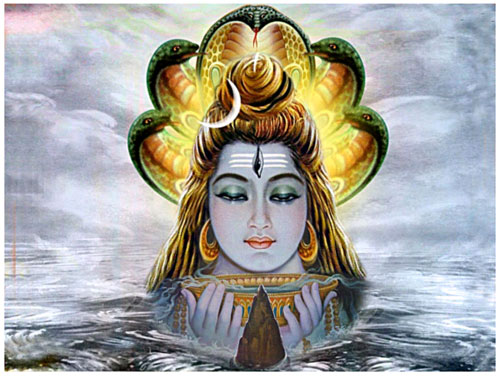×
Maha Shivaratri is one of the most propitious festivals of Hindus. It is celebrated with great spirit and exuberance all across the country. The festival usually falls on 13th night or the 14th day of Krishna paksha (waning moon) in the month of Maagha, according to the Hindu calendar.

In 2017 Maha Shivaratri is on 24th of February.
| DATE | POOJA TIME | PARANA TIME | DURATION |
|---|---|---|---|
| 24th February | 00:09:04 - 00:59:19 | 06:51:58 to 15:27:20 on 25th, February | 0 Hours 50 Minutes |
The festival is substantially celebrated by offering Bael leaves to Lord Shiva, all-day fasting and a night-long vigil. In India, people usually observe a fast on this day, to please lord Shiva and to get him to bestow thy unworthy with determination, glory, fame and virtues. As per the popular belief, worshipping lord Shiva with a earnest will can help the devotees in achieving anything they please.
The devotees chant 'Om Namah Shivay' mantra & expiations are performed in order to reap the boons and blessings in the practice of Yoga and meditation. The planetary position on this day, acts as influential catalysts to ameliorate spiritual liveliness of the devotee. Chanting Maha Mrityunjaya Jaap is highly advantageous on this very night. Wearing a rosary of Rudraksha around your neck and applying turmeric, vermilion or holy ash on forehead exemplifies a holy ritual on this grand festival. Holy Mantras are recited and special puja ceremonies are organised throughout the night to celebrate Maha Shivratri. The coherent steps to be followed to conduct the Pooja are-
The Hindu calendar hinges on the lunar movements in contrary to the modern solar calendar. In modern calendar, this day roughly falls somewhere between February and March. Shiva means kalyana or well-being. He maintains the equilibrium of the nature by serving as the God of destruction, and thus he completes the trinity. Irrespective of the numerous beliefs and abundant stories behind this special day, Maha Shivaratri is commemorated in a uniform and steady mode not only in India but also in the neighbouring country, Nepal. There are various legends behind the commencement of the festival and significant amongst it is-
The wedding of Lord Shiva and Goddess Parvati:
Shivarathri is considered to be as the wedding day of Lord Shiva and Parvati. It is also believed that Lord Shiva performed 'Tandava', the dance of the primal creation, conservation and destruction on this propitious night of Shivaratri. According to the another renowned legend, envisaged in Linga Purana, it was on Shivaratri that Lord Shiva evinced himself in the form of a Linga for the very first time. And since then, the day is considered to be immensely felicitous by the devotees of Shiva and they memorialize it as Maha Shivaratri - the grand night of Shiva.
Mahashivratri is not only one of the splendid festivals in India but also in Nepal and other regions where Lord Shiva is worshipped and reverenced. Most of the Sadhus on Maha Shivaratri visit shrines and offer bhang to the worshipers to proliferate the significance of the festival. The Lord of the fourteenth day, according to the Hindu Panchang is Shiva himself and due to this reason the fourteenth day of the dark fortnight is celebrated as Masik Shivaratri. As per the vedic astrology, if a person worships Lord Shiva on this particular day then the latter receives immense benefits both mentally and spiritually. According to the astrological classics, this day is considered to be very auspicious and it is this day only when Sun moves towards Uttarayan and the change of season begins. Lord Shiva entrenched Moon over his forehead so worshipping him emancipates the Moon of the devotee as Moon gets weaker on the fourteenth day. Since Moon signifies the mind so worshipping Lord Shiva gives you ancillary strength and self credence. In other words it can be concluded that worshipping Lord Shiva brawns your mental ability and engenders invincible mettle in the devotee.
So, we at MyKundali heartily wish you all a very Happy Shivaratri and may Lord Shiva bestow upon you success in your life so that you march on the very path of achieving milestones in your life.